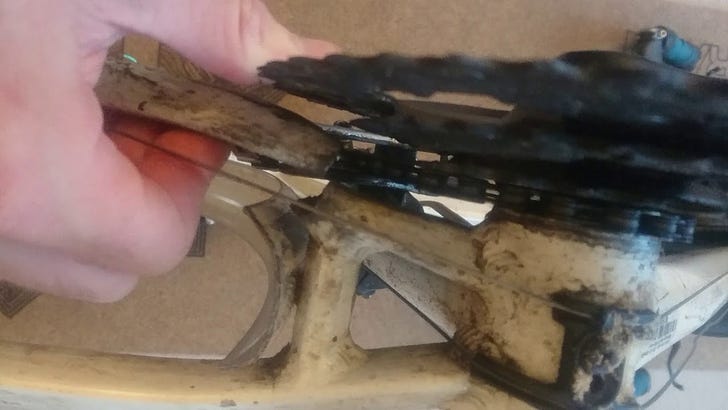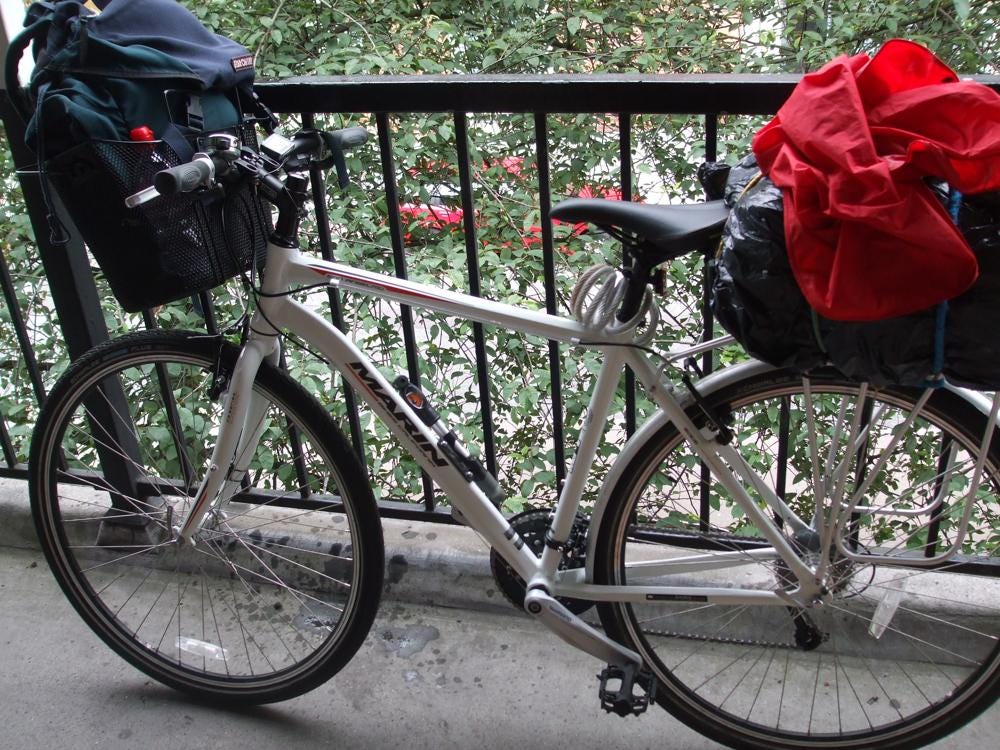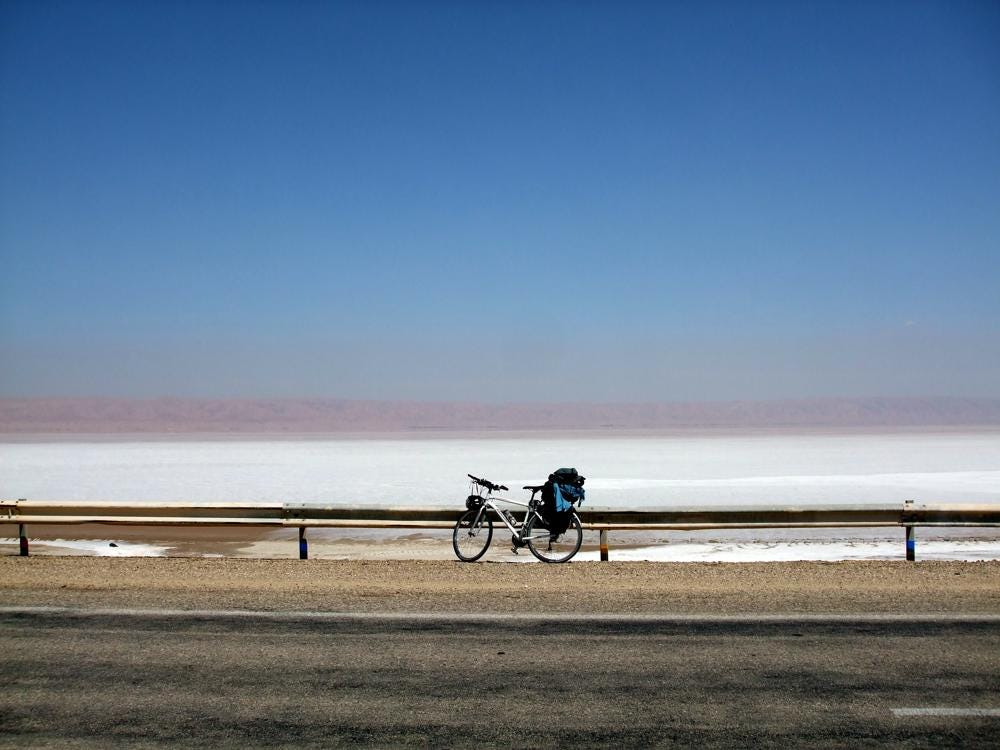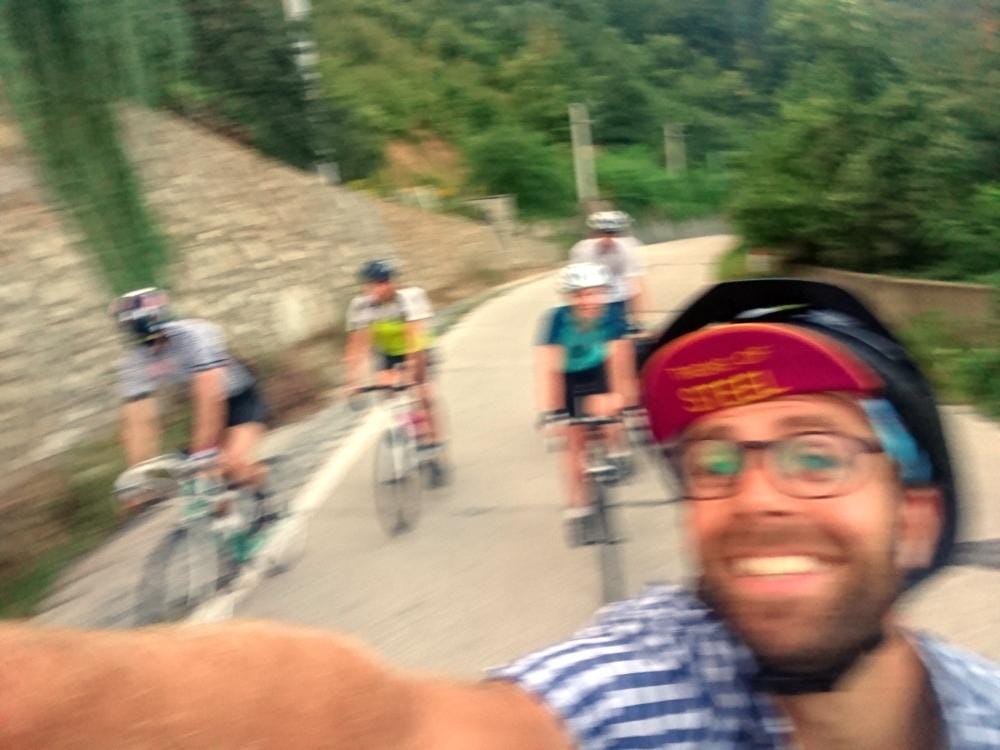This happened after 18,000 miles
This week: Martin the Marin, bamboo bike frames and free books!
Happy Friday!
And welcome to a misty day in the clouds. This week I have been mostly eating homemade vegannaise.
It was so delicious that I was going to share the recipe with you, but my second and third attempts resulted in abject failure and now I have half a litre of oily bean juice sitting in the fridge. I shall continue my experiments and, if I bring back the golden fleece, I’ll send you the secret treasure map next time…
🚲 Read today’s article (9 minute read) on my blog or scroll on…
Brutal! My bike at 18,000 miles
Or: On the importance of stuff
It is with some pride that I announce that Martin, my 2011 Marin San Anselmo touring bike, has finally met his match. At some point in the last few months, the chain stay of his frame cracked and snapped in two.
The fact that neither I nor a professional bike mechanic noticed anything wrong apart from a strange skipping in the chain is testament to how amazing bikes are. Martin was literally snapped in half and I was still more or less happily pootling around.
It’s impossible to say how far Martin and I have travelled together since I bought him in 2011, but a rough estimate using data from various bike computers suggests somewhere in the region of 18,200 miles—more than enough to qualify as a ride around the world.
Martin: A timeline of adventure
Note: if you’re not at all interested in bike touring or my holiday snaps, then feel free to skip ahead to the next subtitle…
Our first journey together, nine years ago, was around the coastline of Britain. Two months of putting one wheel in front of another, wild camping together in fields, under hedges, in forests and on canal towpaths.
A year later, we repeated the trick in Tunisia, cycling through olive and palm groves, between salt lakes, past Roman ruins, and through two different kinds of desert to the sand seas of the Sahara.
In the wet summer of 2016, Martin (now officially christened Martin) rode in duet with a vintage racer called Joy from London to Vienna. We matched tracks from the South Downs to the Bavarian Plateau, from the banks of the River Thames to the vineyard sprawl of the Danube. Our accommodation, still wild, upgraded to hilltop castles and monasteries.
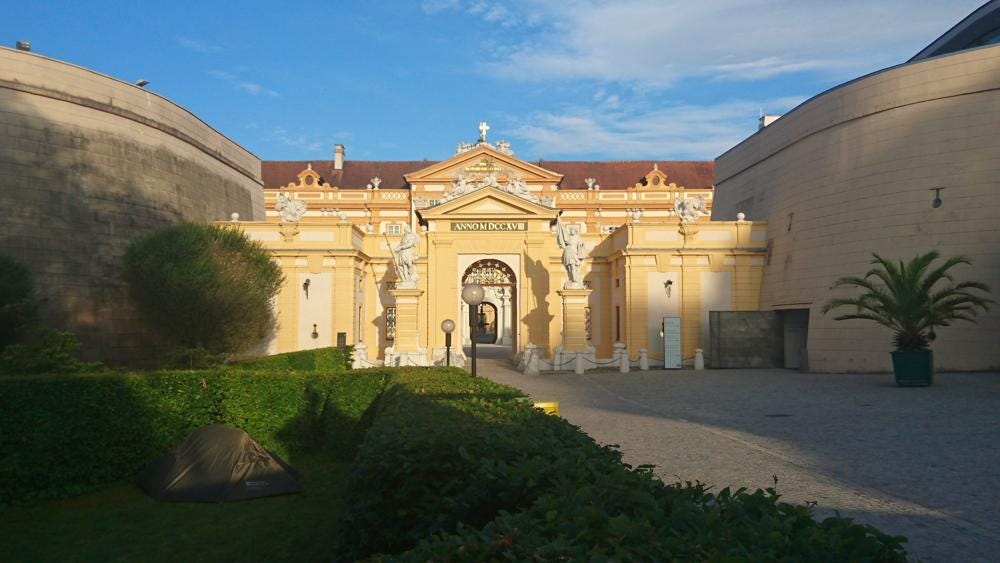
More recently, Martin found true companionship in the community of bikes that is Thighs of Steel. In 2018 and 2019, we covered over 2,000 miles together across Europe, discovering new countries, new friends and new talents. Martin got himself a chainring downgrade which helped us over the mountains. In Athens, he even got himself a blue tattoo, of which he is still very proud.
Finally, in our swansong year, Martin learnt the healthy pleasures of daily rides during a catastrophic pandemic, playing his part in the incredible Around the World project that raised over £130,000 for refugees. And, of course, in the lockdown-lifted summer, Martin came full circle: imprinting the south coast with his tyre tracks exactly nine years after he last toured Britain.
Consumerism gives stuff a bad rep
I don’t want to blow this out of proportion: we’re living through a pandemic. My old bike is broken. I’ll get another one. It’s no big deal. But I’ve never had nearly as much fun with any other object as I’ve had with Martin.
When I flipped him over and saw the thick black crack against his mud and sand-flecked white skin, I felt like I’d slipped into an alternate universe.
A broken frame was nothing more than we deserved: nine years of high-impact, heavyweight touring caught up with the partnership. It was bound to happen one day or another. I was lucky that it didn’t happen while I was out touring—although, on reflection, maybe it did.
Throwaway consumerism has, I think, dirtied the purity of possession. Many people, myself included, have hankered after ascetic minimalism: a glorious rejection of the waste and want that modern capitalism has brought us.
But it’s worth remembering why certain convivial objects are precious to their owners—and perhaps to hold all our purchases to a similar standard of value.
What did Martin ever do for us?
A bicycle extends our human frailties. We become bionic, able to move many times faster and further than we ever could on foot, and much more efficiently. I have done things with Martin that would have been unimaginable without him.
I’m thinking, of course, of the life-altering adventures I mentioned earlier, but I’m also thinking of our day-to-day. Martin made it possible for me to live an expansive twenty-first century lifestyle without ever needing a car or taking an aeroplane flight.
Every week, without complaint, Martin lugs my heavy shopping bags five kilometres across town. Together we’ve visiting sixteen different countries, excluding England, Scotland and Wales. Every day he teaches me something about perseverance, self-reliance and community.
Martin’s made me oodles of new friends and ridden me to work, school and social events—especially during my years in London, where the cost and patchy provision of transport makes travel in the city such an unequal battle. (Hence why The Bike Project gives free bikes to refugees.)
But at what cost?
You won’t be surprised to read that I’ve run the numbers… 🤓 The original Marin San Anselmo cost me £488.99—still the most I’ve ever spent on a single item. But I’ve spent many times more on maintenance and spare parts over the years. To be precise, over his entire lifetime, owning and maintaining Martin has cost me £3,323.
That’s a heck of a lot of money, but—get this—counting from the day I bought him to the day he broke down at the end of my cycle around southwest Britain comes to exactly 3,323 days. Martin cost me one pound for every day that I owned him. Or about 18 pence per mile.
That, to me, is incredible value. There aren’t many other possession that have given me so much. Certainly some of my books, my Alphasmart Neo2 typewriter, yoga mat, guitar, teapot, plants and running shoes. Not much else that I can think of.
What about you? What possessions bring outsized value into your life? I’d love to hear from you—especially if you hold all your purchases to this standard.
On the naming of things
It is only right that we celebrate our most highly prized possessions—and, yes, give them petnames. I never loved Martin so much as when he was baptized Martin and grew a personality. My girlfriend at the time misread the brand name ‘Marin’ and contrasted his blocky functionality with the sleek lines of her own vintage racer.
Giving names to inanimate objects might sound silly, but I think it helps combat throwaway consumerism. A name and a personality is the beginning of a story and, when we tell stories about our favourite possessions, we honour, not only their service, but also the ingenuity, engineering and natural resources that went into their construction.
And this ingenuity and engineering is what’s so beautiful about the design of a bicycle. When Martin’s chain stay snapped, what did I lose, exactly? Why didn’t I feel this way after the rear mech sheared off, or all those times my chain snapped or wore out?
Indeed: what is left of that 2011 Marin San Anselmo that I bought from the Cycle Surgery in Camden Town nine years ago? Nothing more than the handlebars, forks, frame and rack. Everything else has been replaced—even the name.
Stuff has a soul
This reminds me of the ancient philosophical conundrum known as the Ship of Theseus: if you replace, one by one, all the planks of a ship until there are none left of the original, is it still the same ship?
The same metaphysical question is asked of Abraham Lincoln’s axe, which needed its handle and then its blade replacing. It’s a question that could be asked of ourselves: we shed our skin every few weeks and every ten years we get a new skeleton.
But as well as posing an insoluble philosphical question about the persistence of identity over time, the Ship of Theseus prompts us to think about what happens at the end of our stuff’s life.
Aristotle decided that the fully-replaced ship was indeed still Theseus’s. And if a yes is good enough for one of the more practical ancient philosophers then it’s good enough for me.
A great ship is a great ship forever. A great axe is a great axe forever. A great bike is a great bike forever, even as the parts are replaced one by one. Because well-designed stuff has something about it that endures. We could call it a soul.
So I’ll keep what I have of Martin—the original handlebars, forks and rack, as well as all the other components I’ve bought more recently—and replace the broken frame as I have replaced bent wheels, snapped chains and worn brake blocks.
The bike is gone, long live the bike!
What now for Martin Jnr?
Thankfully, a friend has very generously leant me her spare bike to ride (thanks GC!) until I’ve found a new frame for Martin Jnr. One of the more alluring options is the idea of spending this lockdown building my own bamboo bike frame.
I first came across the Bamboo Bicycle Club ten years ago, when I had neither the money nor the cycling experience to justify investing £300 in a wooden bike. But now… Now they do ‘home build kits’—surely it’s meant to be!
Another awesome bike thing
Bicycles, workers cooperatives and the subversion of the gig economy. There’s a lot to love in this story of hope and chain oil.
Getta free book!
This week, I’ve also been pulling together the tree-blood collection of last year’s writing. There’s over 60,000 words’ worth (not as much as a Wordsworth, mind) and it’s yours for the taking if you become one of my paying subscribers.
If you are already a paying subscriber, make sure you send me your address by replying to this email so I know where to send the book.
There’s a lot of good stuff in there and the 60+ articles now come with forty fewer typos—guarantteed!
The spellcheck has been rather fun, actually. Who knew I struggled so much with ‘-ence’ vs ‘-ance’ endings? Benevolence, but semblance. Resilience, but severance. Or, in the article you just read: perseverance, but persistence. There’s probably a rule, but I prefer to guess.
Favourite typo: Anthrolopolgy 🤣
Big love,
dc:
CREDITS
Hello, I’m David Charles and I’m a UK-based writer and outdoor instructor. Say hello by replying to this email, or delve into 500+ other articles on davidcharles.info.
11.3 percent funded ▲▲△△△△△△△△△△△△△△△△△△
These free weekly emails are supported by readers who scroll all the way to the bottom—readers like you 😁 Help unlock the commons by becoming a paying subscriber for £30 per year—about 58p per newsletter. To say thanks, I’ll send you a book!

